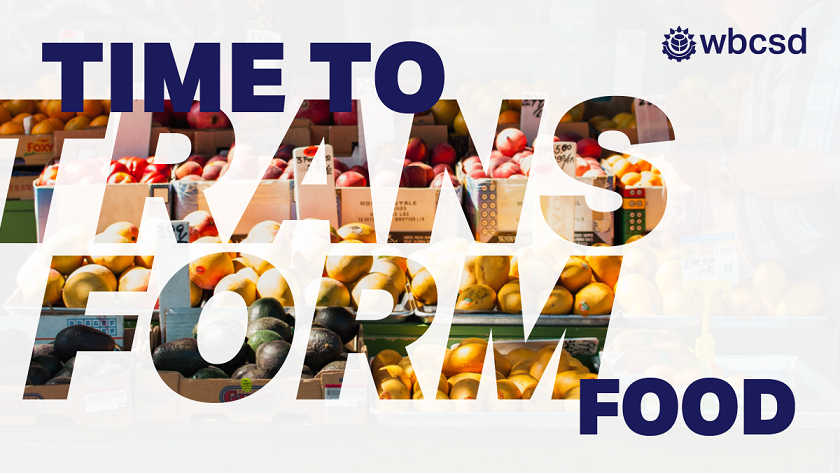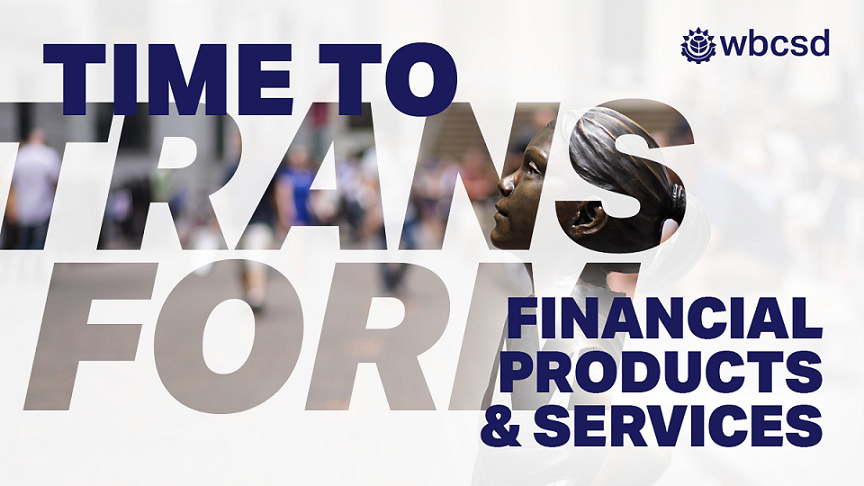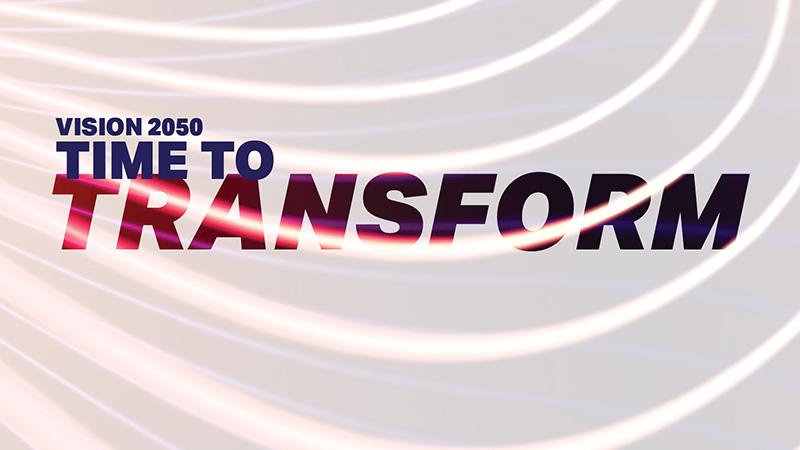Time to transform: How WBCSD is advocating for reinventing capitalism
World Business Council for Sustainable Development (WBCSD) is a CEO-led, global coalition of some 200 leading corporations. The Council is the leading voice of business supporting companies in scaling up true value-adding business solutions to some of the most pressing global sustainability issues and in creating the conditions where more sustainable companies will succeed and be recognized.
Recently, high-level multi-stakeholder coalitions and platforms have arisen, including the WBCSD’s Vision 2050 and Business for Inclusive Growth. Do you think levels of ambition are rising in terms of sustainability commitments from major multinational companies? If so, why now?
WBCSD has been advocating for over a decade that “business as usual” is no longer viable – not for the planet, not for us humans living on it, and not for business. And as we often put it, business cannot succeed in societies that fail.
Yes, the level of ambition is rising around the three key challenges the world faces: the climate emergency, nature loss and mounting inequality. The Covid-19 pandemic has illustrated that these challenges are interconnected, and that our systems are ill-prepared for shocks.
The zeitgeist has finally caught up with the urgency of the challenges that we face, and leading companies have been part of frank dialogues about the need to dramatically raise levels of ambition and accelerate action in a more systemic way.
This resulted in a two-year collaborative approach among 40 of our member companies to produce Vision 2050: Time to Transform as a solutions-oriented perspective – a framework for business action in line with the urgency of the challenges that we face if 9+ billion people are to live well, within planetary boundaries, by 2050.
What makes Vision 2050 unique? How is it different from previous initiatives and visions you have supported?
With Vision 2050 and its supporting materials, we want to give business leaders worldwide access to a complete framework for business action to drive the necessary transformations.
There are five specific components to our framework:
- A clear and shared vision (what it means to live well, within planetary boundaries)
- An understanding of systems transformation on which our action agenda is built
- Nine transformation pathways that lay out tangible actions for business between now and 2030, in alignment with the Sustainable Development Goals (SDGs) and the Paris Agreement
- New perspectives on the three strategic mindset shifts on which transformation will depend: reinvention of capitalism, resilience, and regeneration
- The acknowledgment that business cannot make transformation happen on its own – it must work on and design systems transformations, together with scientists, policy makers, financiers and investors, innovators and consumers
What is new? We build on the latest science, a broad range of expert inputs, and close consultation of intergovernmental instruments and frameworks such as the Sustainable Development Goals and the UN Declaration of Human Rights, to articulate a common view of the future we seek to create, and define what “living well” and what keeping “within planetary boundaries” really mean and look like in practice.
How do large international companies provide opportunities for all stakeholders by pushing boundaries?
Vision 2050 is our contribution to setting a forward-looking agenda that articulates what it will take to run companies well, well into the future. The materials are developed for business leaders across the world – but the report also targets policymakers and investors to better understand the role of business in systems transformation.
The report does push boundaries but is not intended as an overly prescriptive plan or blueprint. Rather, it aims to act as a positive and inspiring agenda that the business community can come together around and use to accelerate transformation.
One specific boundary pushed is the area of capitalism, as we advocate that there are shortcomings in the current model, which does not differentiate value extraction from value creation. In the words of economist Jeffrey Sachs, “It’s all too easy [for some firms] to raise corporate valuations by harming others rather than by producing quality products at competitive prices.” In short, profits are not, in today’s capitalism, a reliable indicator of societal contribution because too many social and environmental costs and benefits are unaccounted for in financial valuations. This situation is a result of failures at multiple levels – from the way we think about and measure economic and business performance, to the market structures and dynamics that favor financial value extraction, to the institutions that are meant to oversee and regulate markets in order to ensure they function efficiently, fairly and sustainably.
But this does not mean that we should abandon capitalism – quite the opposite. Harnessing the power of markets and for-profit enterprises is essential if we are to achieve the scale and speed of transformation needed to achieve our Vision. What we strive for is a reinvented capitalism focused on true value, which would lead to three outcomes that are critical for achieving the speed and scale of transformation required to deliver Vision 2050:
- More well-run companies, making better decisions, that deliver the necessary product, service and business model innovations that contribute to a flourishing society.
- Capital markets properly value inclusive, sustainable business practices, rewarding the companies with the greatest positive social and environmental impact.
- As a result, more capital is mobilized towards businesses, assets and solutions that deliver the SDGs, including the transition to a 1.5°C world.

How do they provide opportunities for smaller inclusive businesses operating along the value chain, for example those working with smallholder farmers?
In their efforts to localize value creation, WBCSD members also rely on local companies as a crucial component of their value chain. As we know from the manifold examples featured by iBAN, smaller inclusive businesses and SMEs more generally can constitute an important source of local supply and service provision to larger corporations. They usually have extensive local knowledge of resources, supply patterns and purchasing trends. By working closely with these businesses, large corporations can develop a new customer base that may not be accessible to the traditional distribution networks of these corporations. SMEs also represent an important source of innovation. They tend to occupy specialized market “niches” and follow competitive strategies that set them apart from other companies. This might include re-engineering products or services to meet market demands, exploring innovative distribution or sales techniques, or developing new and untapped markets. This often makes them good partners for large corporations.
What role does the customer play in pushing companies to examine their supply chains and transform their business models? What role do peer companies in platforms play in encouraging transparency or upholding commitments?
Individuals’ values and behaviors matter – individuals are the ultimate implementers of many of the solutions that will progress the transformations that Vision 2050 requires. As consumers, individuals can help unlock transformation or block it, for instance through where they choose to live, what they eat, what they buy, how they dispose of waste, and how they move around. As citizens, individuals can embrace or reject new ideas, get involved in their local communities, and support or resist equitable and progressive legislation. As workers, individuals make myriad decisions in their day-to-day roles and can influence their employers to make organization-wide changes. If they have capital, individuals can choose consciously where to invest it. However, we must also acknowledge huge inequality in people’s impacts and their access to choices.
With regard to an example of raising the bar through peer-to-peer engagement, we have a number of interesting WBCSD examples at sectoral level, for instance through Forest Solutions Group (FSG), which is the global platform where businesses in the forest products value chain build and share solutions to lead sustainable development in the forest sector. As a sign of members’ shared commitment and as a condition of FSG membership, they endorse and adhere to a set of Membership Principles & Responsibilities, and report annually on Key Performance Indicators (KPIs) to track their progress towards achieving the SDGs.

Is there a risk of ‘greenwashing’ through these coalitions? If so, how can it be mitigated?
The risk of stakeholders, be they from the private or the public sector, “talking the talk” but not “walking the walk” will always be present. From WBCSD’s side, a very specific lever we have to raise the bar for sustainable business leadership are our new membership conditions, focused on net-zero, nature/biodiversity recovery, respect for human rights, inclusion and diversity, and transparent disclosure of material sustainability information. WBCSD members are asked to prepare their companies to be able to adhere to the membership criteria as of December 2022. From 2023, adherence will be monitored on a yearly basis.
The conditions will let our member companies focus on putting credible science-based action plans into motion to transform our economic systems. The fact that these were accepted by a strong majority of the leaders of our members during the 2020 Annual General Meeting, shows that our members are pushing for higher standards.
In sum, what particular value do platforms and new coalitions add in reimagining sustainable business?
Platforms and coalitions can articulate shared ambitions and help raise the collective bar around the recognition that the world now needs a continued reinvention across systems, beyond technologies or sectors.
Platforms can most notably support in collectively addressing systemic challenges such as the way we think about and measure economic and business performance or market structures and dynamics that favor financial value extraction.
